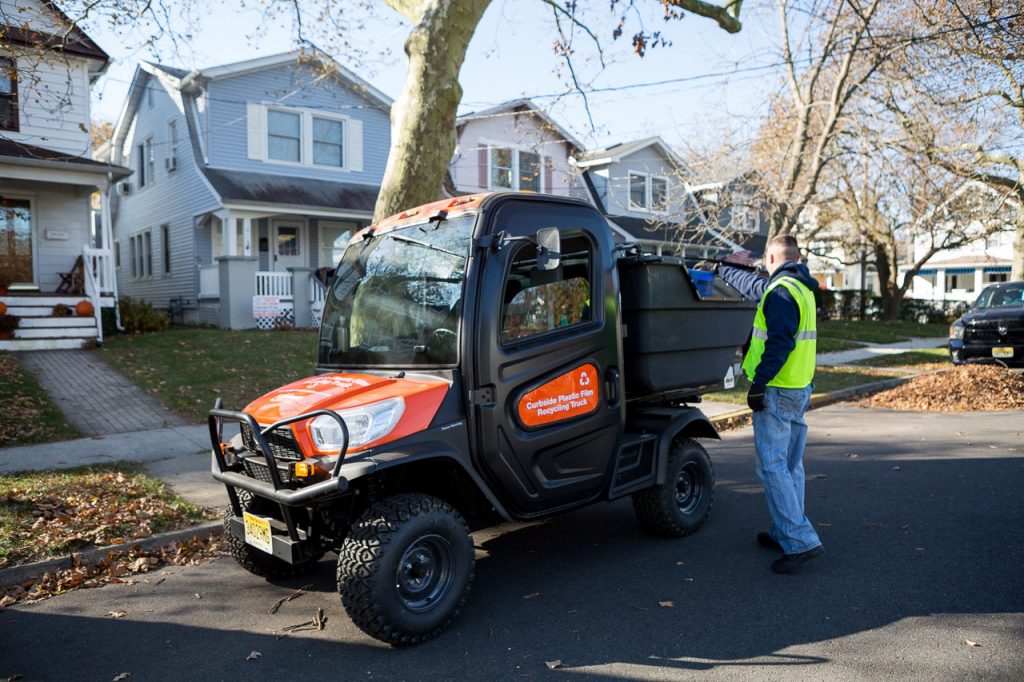
Through the Bradley Beach, N.J. partnership, SC Johnson is providing financial support to assist with infrastructure costs. | Courtesy of SC Johnson
SC Johnson recently launched a pilot curbside film collection program in a small New Jersey community. Rather than mix film into existing single-stream recycling, the program has residents use a dedicated container.
The consumer goods company in the fall partnered with Bradley Beach, N.J. to kick off the film and flexible packaging recycling program. The effort follows previous SC Johnson projects to explore curbside recycling of film. The New Jersey initiative is unique, however, because it implements additional infrastructure rather than just mixing the materials into the curbside stream.
Bradley Beach, a community of about 4,300 residents, has made film collection available to every household that already receives curbside recycling service.
The project kicked off in November and will run for a year. During that time, the company and city plan to gather metrics on how much film is collected, what the program costs look like, end markets and more.
Separate collection reduces contamination concerns
SC Johnson is interested in curbside film collection as a way to increase diversion of plastic film, which is one of the most commonly used packaging materials, said Heather Berlinski, the company’s government relations manager, in an interview.
There are about 18,000 retail stores offering film recycling, but only about 4% of all recyclable film is captured through these options, Berlinski said.
“While those programs are important, they’re not meeting the recycling rates we’d like to see,” she explained.
Given that many consumers are already familiar with curbside recycling, the company views incorporating film into the curbside stream as one of the best ways to increase capture of that material.
However, bringing film into the curbside stream can create problems in the sortation process, because it often gets tangled in equipment at materials recovery facilities (MRFs). Bradley Beach is avoiding that problem by collecting film in a separate bin and bypassing the MRF. That bin is collected once per month by vehicles separate from those collecting single-stream recyclables.
“Having that sortation done by the resident and having the collection done separately really assists in having a clean stream of material, that very similarly mimics the type of collection that’s done in those retail drop-off programs,” Berlinski said.
Residents can recycle retail carryout bags, dry cleaning bags, bread bags, cereal bags, food storage bags, certain clean food packaging and more. That allows the program to use the same educational messaging it does for retail drop-off sites.
Through the Bradley Beach partnership, SC Johnson is providing financial support to assist with infrastructure costs, including paying for the film collection bins.
Plastic film is collected at the curb once a month. | Courtesy of SC Johnson
End markets still under consideration
As of mid-December, the Bradley Beach program had done two collections and had not yet tallied the weight of film collected. The film won’t be shipped to a buyer until a certain weight has accumulated, Berlinski said.
Common end markets for plastic film collected through the retail setting include composite lumber, playgrounds and even some packaging materials used in e-commerce, Berlinski explained, and these are some of the markets the pilot program will be looking to sell into. As of mid-December, buyers had not been finalized.
The program is aiming to move its first shipment this year.
“The desire is to have the material be transported to a processor who will then recycle the material and sell it back to product manufacturers,” Berlinski explained.
Company reports consumer interest
Berlinski noted education is one of the key challenges with introducing a new material into the curbside stream. But she said there is significant public interest in additional film recycling options.
“What we’ve heard from communities that every community struggles with is that residents want to recycle film; they are confused and they think film is a plastic that can be recycled,” she said. “So they put it in their bin believing it gets sorted and recycled, and a lot of them are dismayed to hear their existing program doesn’t allow the recycling of that material.”
SC Johnson is hoping to expand these pilot programs to as many as a dozen or more communities across the country. The company recently announced a second curbside film recycling partnership in Point Roberts, Wash., in that case collecting film bundled in a bag that’s collected in the mixed-paper stream. That project kicks off this month.
The company is actively looking for additional municipalities to work with. Interested municipal programs can contact SC Johnson at 262-260-2440.
More stories about film
- WM closes Natura PCR film operation in Texas
- FFP barriers continue to restrict recycling systems
- Shell to supply chemically recycled PE for specialty films